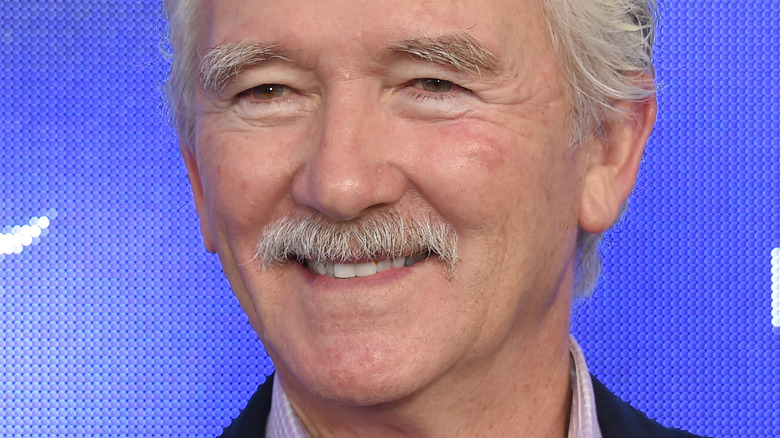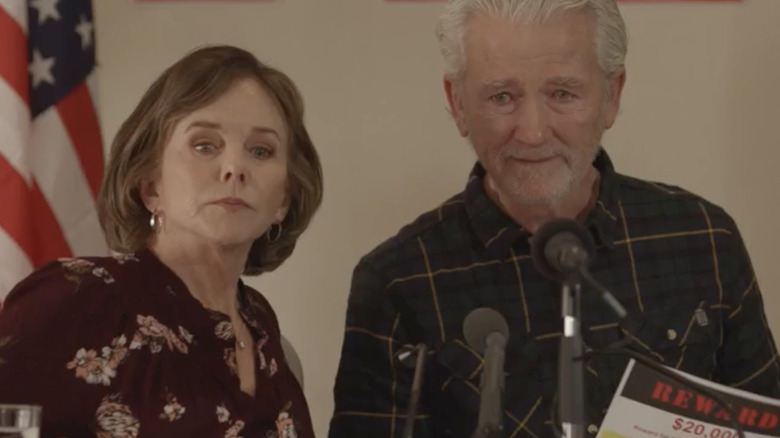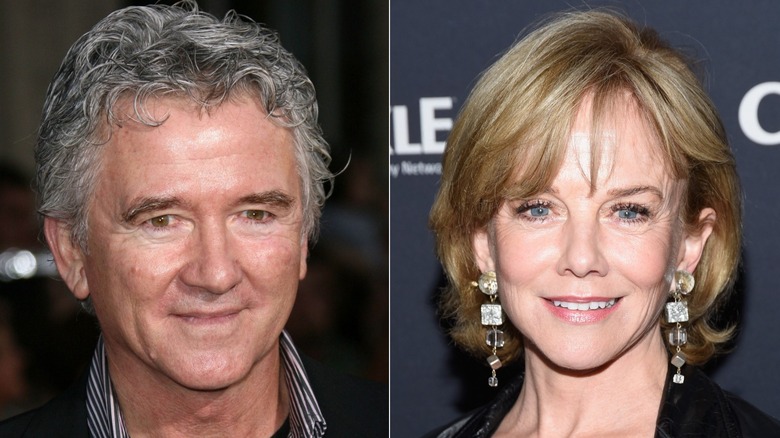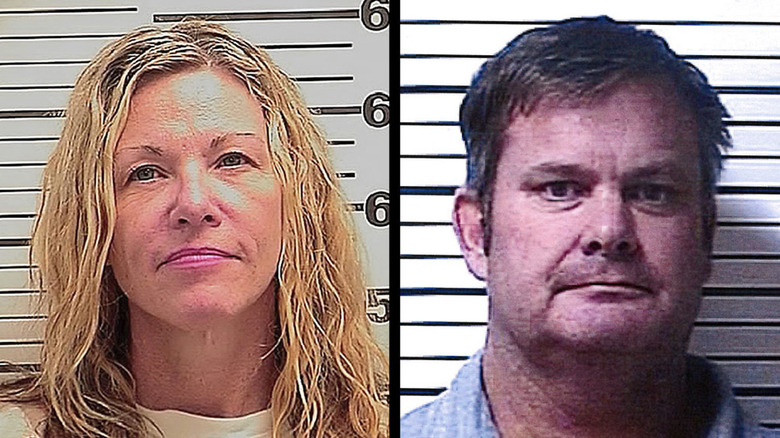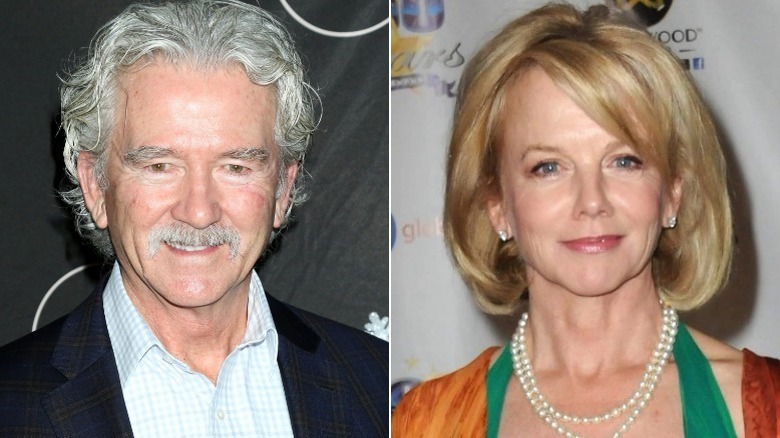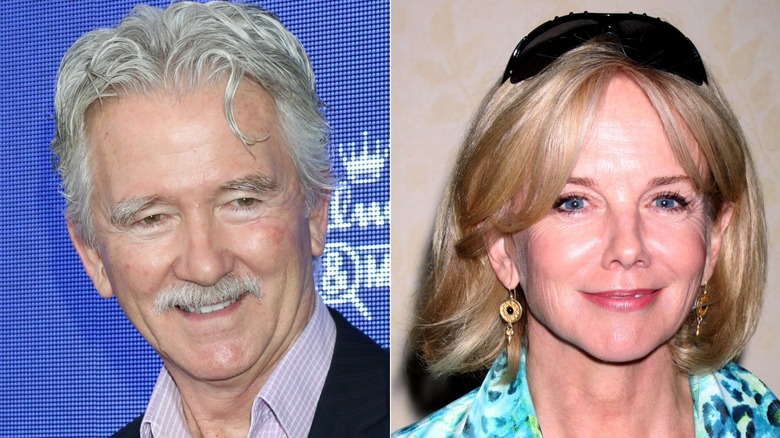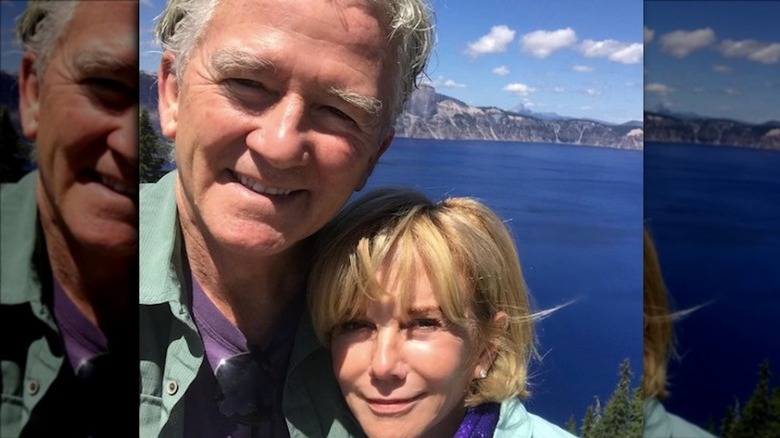Patrick Duffy & Linda Purl Dish The Secrets Behind Their Lifetime Movie - Exclusive Interview
Everyone remembers Patrick Duffy as all-American single dad Frank Lambert, who wrangles his unruly Brady-Bunch-style blended family alongside TV icon Suzanne Sommers in the long-running Friday-night comfort-com "Step by Step." In real life, Duffy had to start again, too. In 2017, he lost his wife of 34 years to cancer. But then, in 2020, as the world was frozen by the COVID-19 pandemic, Duffy found love again — this time with Pam Beesly's fictional mother from "The Office," Linda Purl, who somehow played Michael Scott's girlfriend with a straight face.
The relationship began innocently. Texting gave way to nightly zoom calls. Then, Duffy simply showed up at Purl's door and they've been together since. And being stars of the screen, they decided to make a movie. This one is about a new relationship too, but not the happy kind.
Lifetime tapped the new couple to star in "Doomsday Mom," in which they play the concerned grandparents of Lori Vallow's adopted son, JJ. Vallow gained international fame when she began an affair with her fifth husband, end-times author Chad Daybell. People around the couple started dropping like flies: their spouses, her brother. Then, Vallow's children went missing. Vallow and Daybell were indicted on child murder charges in 2021, but Vallow's seemingly sincere belief in demons led to her being declared mentally incompetent to stand trial. Duffy and Purl sat down with Nicki Swift to talk about this end-of-the-world figure, but also, how they found real love in a genuine pandemic.
Patrick Duffy and Linda Pearl protect their families from cultists like Lori Vallow
Obviously, this story is fascinating. You two have been working in Hollywood, L.A. a long time. Have you had any experience with cults yourself? There's a lot of cults attached to the movie business — or so that's the legend.
Patrick Duffy: Oh, the definition of a cult is pretty broad. There are cultish figures around just celebrities. And then, there's the deep dive into cults that are life-threatening and indeed, life-ending. So, I haven't had any experience with something like that. The interesting thing is, personally, I tend to avoid extremely large group activities like that, that are so centered on either a charismatic leader or something like that, that it always makes me feel a little woozy. So I just developed this antenna, I guess, that I avoid it without running from it, basically.
And so, no, I haven't had that experience. But I do know people who have— friends that have had to extricate their children out of places like that and things like that. So, as a parent and a grandparent, it's always somewhere in your mind, which made this particular project be very prescient in terms of the immediacy of the kind of problem that exists out there, for sure.
Linda Purl: Yeah, I have not. I'm grateful to say, same as Patrick. I've known a couple of people who have had a few experiences with that but have been able successfully to extricate themselves or those they love. But they're a pretty terrifying phenomenon.
Patrick Duffy and Linda Purl offer their perspective on the twisted mind of Lori Vallow
Yeah, watching your movie "Doomsday Mom," put to mind many cults have this paradoxical vision: the end of the world is coming, but also, surviving, right? Lori Vallow is a good example. She thinks everything is ending, but also wants to be among the chosen fighters who beat it out. What is that about?
Linda Purl: I think it started with the archetype that they identify/create the problem. And then, swoop in to say that they have the solution. And I mean, it's understandable to the degree that we all want our fairy godmothers to swoop in and solve our problems. But, the complexities of the projections and the neurosis that played into this particular scenario are terrifying.
Yeah, former cult members often talk about having this feeling of being a searcher. It's almost like they're too open-minded — desperately wanting some kind of mission or a higher purpose that sucks them down a dark path. Was that your vision of Lori Vallow in this film?
Purl: Well, I think that's really insightful. Probably so. I mean, who knows why she felt so vulnerable or was so easily led. And so [Chad Daybell] could overpower her love for her children or exploit that and twist that. I mean, the machinations of that mindset are impossible to grasp rationally.
Patrick Duffy: Mm-hmm, and if you're looking legitimately, let's say, for her, at some point in her life, for that rapture, that place to go which a lot of philosophies and religions have that. You're going to go to Heaven, you're going to do this, you're going to do that. And then, when you sign onto that and it becomes so entrenched in your being, and then they drop the pearl ... Not the P-U-R-L, but they drop that little thing of, "But there's obstacles."
For Lori to look at her children as an obstacle towards art, where the brain goes into La La Land, and that's where it becomes dangerous. But again, I think that that tendency is inherent in people, just in general. We want the daddy/mommy figure. We want the person to resolve our problems. We want to go someplace where it doesn't hurt so much. And then, if somebody gets in your way, and you're told that that's the reason it's never going to happen, you become a soldier for what you consider the right. And then, it becomes our storyline. And it's a tragedy, and to this day, I saw one interview — this was while we were shooting, actually, I think, or maybe just before where she was in jail — and she actually was saying no, she didn't think she did anything wrong, to this day!
So that's how deep-set the illusion is, that it has taken over. And that's why now, apparently, according to the latest news, that she's deemed unfit to stand trial, which is to me, obvious. That was a given, as far as I was concerned. And like Linda said, there's the paradox of it. It's part of what happened, and yet, it's inexplicable.
Another thing I noticed about cultists is, they don't seem to believe the maxim: don't believe everything you read. Lori Vallow, in "Doomsday Mom" and in real life, not only takes the Book of Mormon prescriptively, but the explicitly fictional works of Chad Daybell, she takes those literally. Why is that?
Purl: Maybe just once you're in a particular mindset, you will see everything through that lens. To greater and lesser degrees, we're all guilty of a prejudicial view. So, I think she just chose to have that and interpret that as fuel for her cause and for her new mission. You do want, when you see someone so tortured, you just sort of almost want to ask, "Where does it hurt?"
Because that kind of misguided passion, I'd like to think anyway, has to start with some basic psychological injury that could be addressed.
The stars of Lifetime's Doomsday Mom interpret the misguided passion of Lori Vallow and Chad Daybell
When Lori Vallow meets Chad Daybell in "Doomsday Mom," she seems very flattered when he tells her she has a special role in the apocalypse. That's very appealing to her. That's one of the keys of this cult — you're going to get a front-row seat to a secret history that's unfolding. And not only that, he deemed her a god who has to hunt demons. But simultaneously, she's also falling in love with Daybell. Do you think she confused these two things?
Patrick Duffy: Well, passion is passion. It's just how much other stuff you put in from your personality then. So her passion [was] to, I would assume in the very beginning, to do the right thing, to find the right path, et cetera. And then, she's put in the presence of this charismatic person. So that passion, I can see in the script how it just got transferred. And then, he became the object, as well as the provocateur, to get her to do those things. So, she was the perfect victim. And I know people don't want to feel sympathy for somebody who does something so horrific, but in that sense, she was the perfect victim going in it, and then was swept away by virtue of it.
Speaking of Daybell's manipulations, I thought his character was kind of funny in this. Guys come up with a lot of creative ways to cheat on their wives, but I think 'I've opened a portal in your closet' takes the cake on that. You know, so his wife won't hear his cell phone ringing, or whatever. Yeah, just 'go into your closet and speak to me that way.' Do you think Daybell believed this stuff too? Or was he more of a huckster?
Duffy: Well you know, the actor who played Chad Daybell [Marc Blucas], in an interview, he was saying that Lori was one type of character. But when he saw ... I'm putting his own words in his mouth, so I'm sure he'll forgive me. When he saw the actual mugshot of Chad Daybell, he said he saw something in his eyes that he interpreted as remorse. That he saw something that he, as an actor, was able to hook onto that it had gone too far, but yet, he was still incapable of controlling it.
But at that moment when it all went to hell in a hay cart, he saw in that mugshot that there was a bit of humanity in this man that had been taken away, but it was there. And that was obviously not apparent in Lori. But [Blucas] saw it in Chad, and that's what he based his whole journey through that script on. He got carried away, too, but in the end, it was like, "What the hell was I thinking?"
And you only do that once you get caught, of course. But still, it was there for him. So, I thought that was an interesting observation that he had.
Linda Purl: I'm sorry, I can't imagine it — except that I will –I imagine that it must feel very powerful to suddenly have control of someone's life. Not to confuse it, but for some, the elixir of power is unstoppable.
What are Patrick Duffy and Linda Purl's thoughts on how Lori Vallow should face justice?
When Lori's husband dies at the hands of her brother in "Doomsday Mom," she makes a statement to police that I think is verbatim from what is reported that she said in real life. And she was pretty much indifferent to his death. And recently she was declared mentally incompetent by a psychologist to stand trial, but a judge will decide. Do you both feel she's too delusional to even understand what she's done?
Linda Purl: I don't know that that matters, in my mind. I mean, the deeds were done, and so justice should be met. And there is no justice. There's no, nothing will set this to right. But I don't think ... I don't know, in my non-legal, judgmental mind, I think it's irrelevant. She needs to be locked up forever.
Patrick Duffy: I think the problem we have with the system, one of them, is that it's not an either/or situation. You're not incompetent to stand trial. You're incompetent to be held accountable to the full extent of the law for your deeds. But she should be tried. She should be found either innocent or guilty based on the acts and the criminality of her behavior. And then, the punishment should be meted according to her capabilities to understand her acts.
So, you can be guilty and spend your life in an institution for observation. Maybe things can be learned about this. I know that the knee jerk would be, whether she committed these murders or was responsible for these murders, is it the death sentence? Is it this or that? There is a gray area. There is a middle ground to this. And so, it's not just too incompetent to stand trial. My opinion would be, she's too incompetent to be punished to the extent of the law that someone who does it from a completely different standpoint would be punished. But still, innocent or guilty is not dependent on that, in my opinion. And I know, that's been debated throughout the legal system for tens and tens of years. But it is, to me, it's a dilemma. And we haven't solved that dilemma yet.
A lot of healthy people around Lori Vallow dropped dead, including her own brother, who was possibly an accomplice in some of the murders. Do you have a theory about that? Obviously, the statistics say poison is a likely mechanism for mysterious familial murders committed by women. Chad Daybell's wife was seemingly healthy, too, and died suddenly at a very convenient time for Lori. Some of the autopsy reports say it was natural causes. Any theories?
Linda: I don't. I think it's sort of dangerous, at least for me, to speculate on that. Just let the process of the proper truth-finding process play out and hold judgment until that time.
Patrick: Those things have a tendency to be revisited a lot. And so, I agree with Linda, a knee-jerk response is all we have right now. But autopsies get done and then get redone, and then bodies get exhumed and a different test is done. So there are many things that can happen down the line that will redefine again, the chronology of this particular case. So, to weigh in on it now is a minefield that could come back and just trip you up. So, I agree with Linda, let's see how it plays out because it's obviously not done yet.
How Patrick Duffy and Linda Purl found love during Covid
You both play the grandparents of the children who perish in this film. And you sort of crack the case for the cops. I read that you two actually connected via a group text. And then, Patrick, is this true, you drove 20 hours and showed up on Linda's doorstep. And you've been together since?
Patrick Duffy: No, it's not true. It's not true. I drove 23 hours.
23 hours!? Okay. It seems like maybe you had a vision too. Is that the case?
Duffy: Yeah. Well, she is basically my cult leader right now.
Linda Purl: Thanks a lot.
Duffy: It was a process that happened over a long period of time. Quite literally during the pandemic. Started very innocently as just very friendly texts every week or two weeks or something, because we have mutual friends in common. What are you doing now? My show's canceled, or my film was canceled, you know. And then, we started to eliminate everybody else on the thread, and it was just the two of us. And it went from texting to FaceTime to Zooming. And then, we Zoomed for over two months, for two to three hours every single night.
Purl: Because it wasn't like we had anything else on our calendar. Like, "Do you have anything going on?" "Let me check, oh no, nothing for the next year."
Duffy: Yeah, so you know, and I baked all the bread I'm going to bake, so let's just figure out what to do. And at one point, and we both remembered this moment as very far into the Zooming and the two hours difference. So, she would be tired sooner. So one time, it was like, "Okay, I'm going to bed."
"Okay, I'll talk to you tomorrow."
"Okay, good."
And just before you push to end the Zoom, I said, "Okay, bye-bye, I love you." And I pushed the Zoom off. And I went, "Oh my God."
Purl: What?!
Oh no, you never want to be the first!
Duffy: Oh, I ...I said the L-word. I said the L-word.
Purl: Yeah, dropped the L bomb.
Duffy: And then, that just took it to the next level, and it was shortly thereafter that the decision had to be made. And it was way past time to just see her on a one-dimensional program. And I had to get there. And we said, "Yeah, let's do it." And I drove there, and I never left.
Patrick Duffy and Linda Purl on making a relationship, and a movie, during a pandemic
So you two met in a kind of apocalyptic situation, and then you end up making a movie about a woman who believes there's an apocalyptic situation going on, right?
Linda Purl: It's interesting, yeah.
No demons in this relationship, right? But how was it working together after being this new couple?
Purl: Well, there were two tests involved, I think, for the movie. The first was that we had two weeks of quarantine in Canada. Even though we'd had our vaccinations, the Canadian protocol is very strict but very good. So, we got there. "Hi, welcome to Canada. Here's your room." You're just banging your head against a wall for two weeks. That was a bigger test, if you will, than working together. But we did really well. We laughed, we cooked, we figured out at this point a pattern where we'd be walking a mile. We made stupid little videos, just quarantine videos, little journeys into the absurd.
So, that was easy. Then, we're out of quarantine and it's like, work, work, we can do this. And it was great. We didn't know going in what it would be like. I mean, we had a sense of what it would be like to be on this set together, but everybody has their own peculiarities, their own way of working with the crew or rehearsing and stuff. And thank heavens, Patrick's and my ways or rhythms were very simpatico. Right, honey?
Duffy: Absolutely. And it was wonderful to go to work together, work together, and go home together. I never experienced that in my entire career in this business.
Purl: Yeah.
Duffy: And to do all of it joyfully. And to actually — I've seen Linda's work, obviously — a ton on film. But you don't know how somebody arrives at what they do. And that could have been a moment of consternation, maybe. But it wasn't. I just sat in awe of everything I could see, and her work ethic, and what she became when she stepped onto the set. All of those things were just, oh, well, this is just another indication it's the perfect time for us to be together.
Purl: Oh, thank you, honey.
So, you two rode out the pandemic together. And I noticed you were not in scenes with anyone else. You were mostly on actual Zoom calls with the Lori Vallow character in the film, right?
Duffy: Right.
Was that because there were still protocols in place and the cast was being kept separate when you were filming?
Purl: Well, I'm not aware. That's a good thought. You know, I don't think so. You?
Duffy: What you said, though, before about this being based on the real case files was true. Bradley [Walsh], the director, and Karen Glass, the producer, when they were putting this together on the page, they took great pains to be as accurate as possible. And like you said, the dialogue was taken directly from the transcript, and then cut to fit the scenes, et cetera. And so all of these things were actually true moments that are based on the press coverage. So, a lot of our scenes were interviews by a press person. And these were taken verbatim, pretty much, and put right into context of what was being filmed. So, they did this. They did texting, they did Zoom calls to the grandchildren. And this was all taken from the testimony of what happened.
So, we felt it was really a true-life depiction of the two of us and our separation from the events, and yet, especially Linda's character, her intrusion to get to the resolution. So, it was all quite valid.
Well I really enjoyed the film. And I'm glad that this relationship is working out better than Lori Vallow and Chad Daybell's. Much more productive.
Purl: So far, so good.

